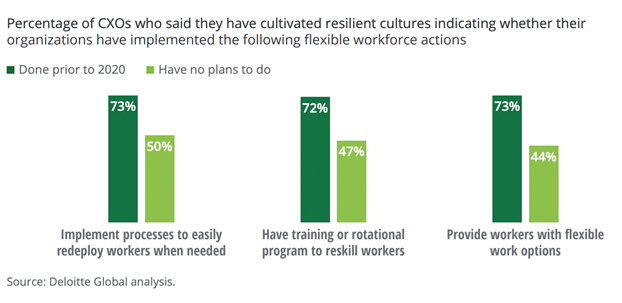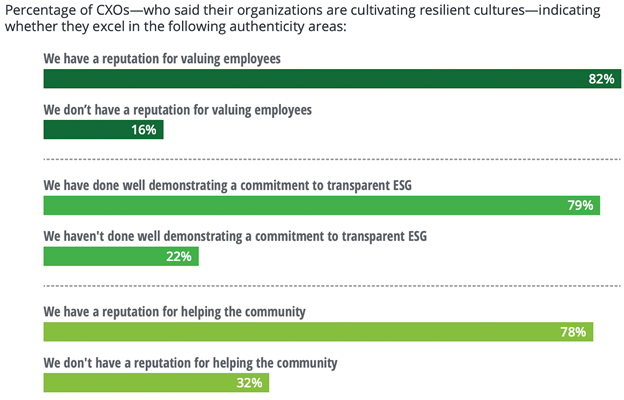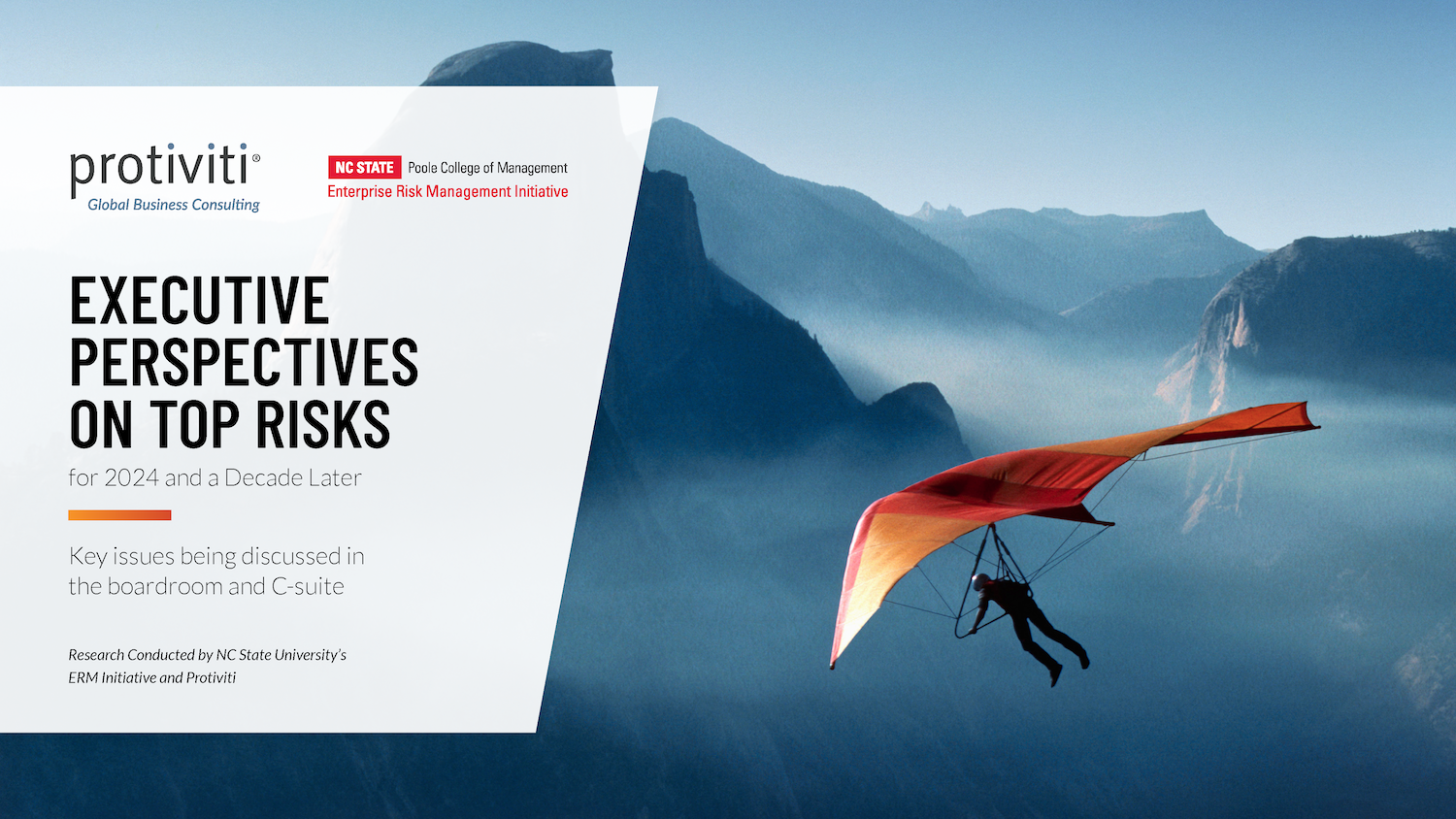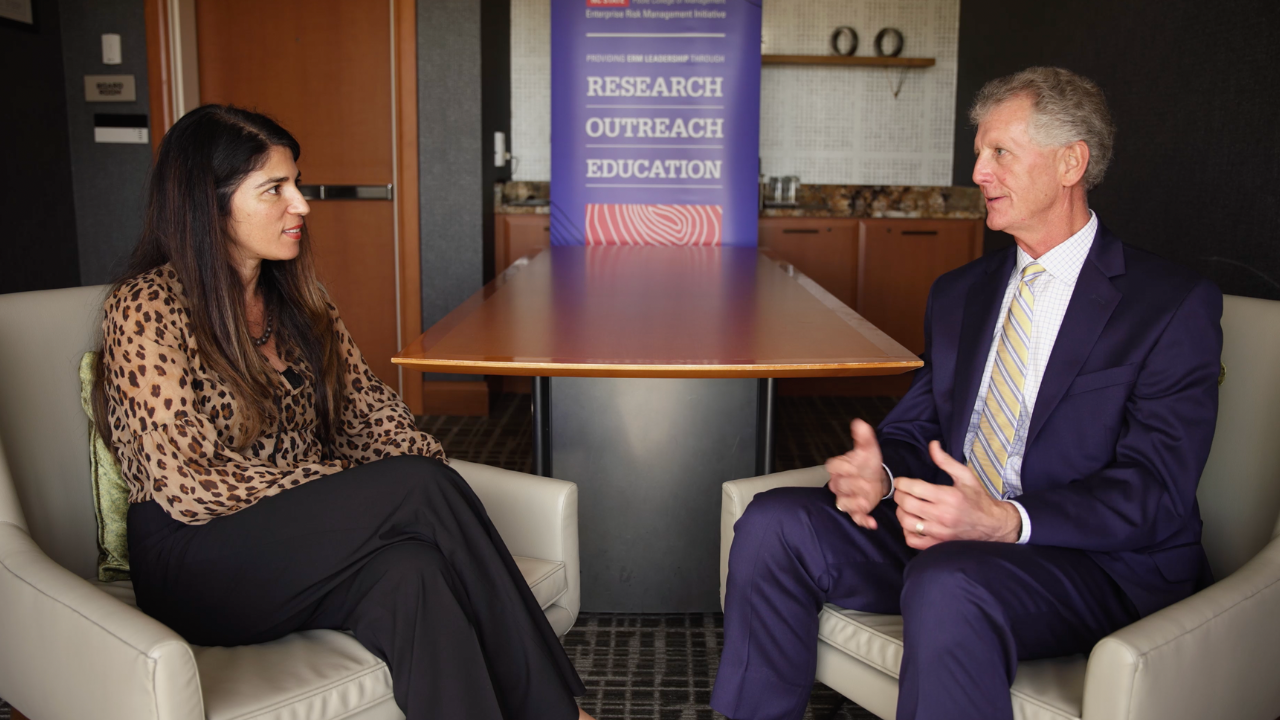Five Actions to Build a Resilient Organization
Article Summary
How can you build an organization well prepared to overcome disruptions and thrive amid extreme circumstances? The 2021 Deloitte Global Resilience Report explores the topic of organizational resilience. Through 2,260 interviews with public- and private-sector CXOs in 21 countries, Deloitte identified five organizational characteristics common to those that have proven to be positioned to adapt, bounce back, and persist amid disruption. This abstract of the report translates those traits into five actionable steps you can take to build resilience in your organization.
Five actions you can take to build a resilient organization.
#1: Prepare.
Benjamin Franklin once wrote, “By failing to prepare, you are preparing to fail.”
Anticipating and planning ahead for disruption—including planning for short- and longer-term challenges and opportunities—is the first step to building a resilient organization.
The Deloitte study found that organizations that were actively planning, investing and taking action in key areas prior to 2020 were better able to weather the disruptive events of that year.

#2: Adapt.
Being flexible and adaptable may seem obvious to build a resilient organization, but it’s not as simple as it may seem.
To create lasting adaptability, organizations must consider both what’s necessary in a current crisis and what may be necessary to deal with future disruptions.
- Consider embedding advanced technologies—cloud, robotics, analytics, AI and cognitive technologies, nanotechnologies, quantum computing, blockchain, sensors, andIoT—into your core operations to support adaptability. When deployed effectively, these enhancements are shown to increase revenue, reduce costs, build security and transparency into supply chains, among other benefits.
In the Deloitte report, CXOs overwhelmingly cited “flexibility and adaptability” as the most critical workforce trait for an organization’s future.
- When recruiting talent, consider a mindset approach in lieu of or in addition to a skill set approach.
The report also indicates a positive relationship between organizations that have implemented flexible workforce actions and those that claim a resilient culture.

#3: Collaborate.
How does collaboration support building a resilient organization?
- When people work together, a diversity of perspectives surface, and information flows more easily.
- In contrast to working in silos, collaboration helps organizations reallocate resources across the organization to ensure business continuity amid disruption.
Deloitte’s research validates that collaboration improves resilience. Two-thirds of surveyed CXOs who said they removed silos in their organizations before the 2020 pandemic reported faring better than their peers—more than 20 percentage points greater than the proportion of CXOs (45%) whose companies had not.
- To break down silos in the organization, consider regularly holding cross-functional leadership meetings to solve problems and raise issues across the organization.
- You can accelerate collaboration by investing in the technologies needed to facilitate working together.
#4: Build trust.
“Trust is built in normal times, but it’s really tested during the hard times. When you can stand by your people and your clients in times like these, you really earn that trust and strengthen your relationships more than ever before.” —— Linda Seymour, CEO, HSBC Canada
- The bad news? Trust in business, government, media and other powerful institutions has eroded over the past decade.
- The good news? The Deloitte report asserts that “cultivating trust is actionable,” and leaders can act to build trust among their internal and external stakeholders.
- How to build trust? Consider stakeholder needs across three dimensions:
Physical trust: Protecting the physical safety of stakeholders is a leading factor in building resilience. More than 72% of CXOs in the Deloitte study who believed their organizations kept employees and customers safe during the pandemic also believed their organizations did well withstanding the disruptions of 2020.
Emotional trust: The 2020 Deloitte Global Millennial Study found that, even pre-pandemic, a significant number of millennial and Gen Z employees suffered from mental health challenges—notably stress and anxiety. The pandemic shone a light on the need for leaders to address their workers’ mental and emotional needs. And, 82% of CXOs whose organizations had provided adequate mental health resources during the pandemic also reported resilience within their organizations.
Digital trust: While remote work has skyrocketed in the past few years, just 55% of surveyed CXOs felt their organizations had done well in managing cyber threat detection, remediation, and prevention. In fact, digital trust goes well beyond basic cybersecurity to the ethical implications of advanced technology investments. Nearly 85% of surveyed CXOs who said their organizations had done a good job implementing ethical tech also said they believed they had shown resilience during disruption.
Ultimately, CXOs should have a plan in place to build trust along these three dimensions. To start, ask your leadership team these questions:
- Are we providing a safe environment for our workers?
- Are we instilling ethical principles into our advanced technology?
- Is our supply chain transparent?
- What cybersecurity protections do we have in place to support our customers’ and employees’ privacy?
- What mental health resources are we providing our employees?
#5: Responsibly balance stakeholder needs.
Resilient organizations focus on responsibilities beyond the “bottom line.” They align their actions with a meaningful purpose and consider the needs of their stakeholders—customers, employees, contractors, communities, and even the planet.
This “stakeholder capitalism” is of particular interest among generations entering the workforce—talent that organizations need to attract and retain to be sustainable. And, a key reason that responsibly balancing stakeholder needs builds long-term resilience.
CXOs noted that their stakeholder investments can be beneficial to their business objectives, as well. For example, Sumitomo Corporation’s CRO Masaru Shiomi says of their environmental investments, “We are seeking carbon neutrality by 2050, not only because it’s the right thing to do, but also because we believe a sustainable society will create additional business opportunities.”
The Deloitte report also showed a strong correlation between organizational agility and a focus on an inclusive culture and a diverse workforce. Just 8% of CXOs from organizations lacking in inclusion and 22% of those from organizations lacking in diversity said their cultures were agile.
Ultimately, cultivating excellence as an employer and an agent for good in the world is a strong indicator of a resilient organization.

Start by Taking the First Step
To strengthen resilience in your organization, ensuring you are prepared for promised change and disruption, you should turn your focus to preparation, adaptability, collaboration, trust and responsibility.
If that seems overwhelming, however, Deloitte suggests some specific and immediate steps you can take to get started:
- Create comprehensive crisis response and scenario playbooks that map out potential internal and external risks.
- Conduct regular crisis and scenario simulations with key decision-makers across functions and departments.
- Hire for specific mindsets instead of specific skill sets.
- Develop training or rotational programs that allow workers to learn new skills and capabilities.
- Eliminate internal silos and invest in technologies that promote collaboration.
- Seek relationships with like-minded organizations to tackle societal issues.
- Develop environmental-sustainability initiatives inside your organization.
- Build physical, emotional, financial, and digital trust with your stakeholders.
- Prioritize mental health, wellness, diversity, inclusion, and equality.
Original Article Source: “2021 Deloitte Global Resilience Report Coping with the unexpected challenges”, Deloitte, 2021.
- Types:


